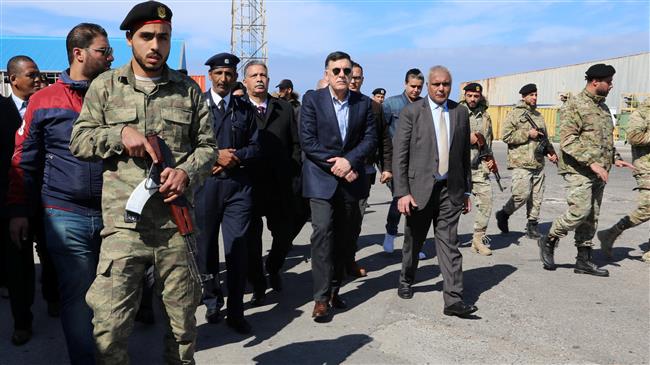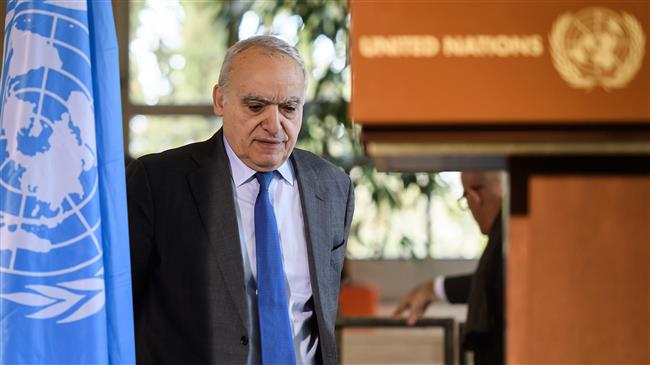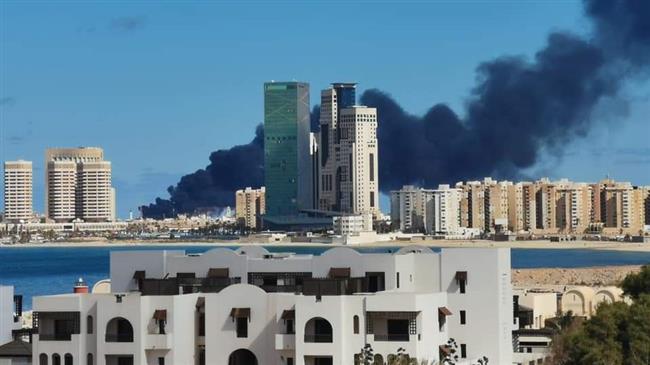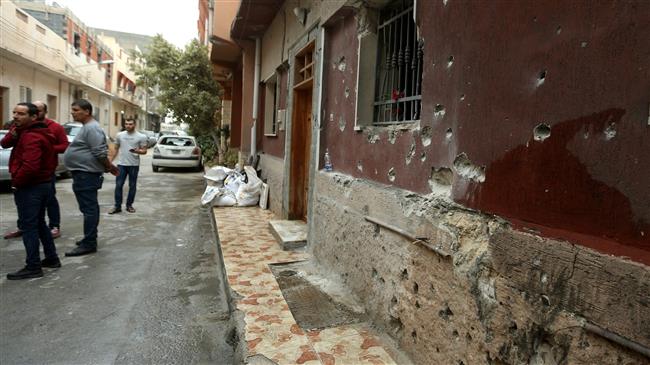UN says Libya’s warring sides propose ceasefire proposal in Geneva
The warring sides in Libya have proposed a draft agreement for ceasefire that could turn a frequently-violated fragile truce into a lasting deal and would see the United Nations monitor the safe return of the displaced people in the country, the UN says.
The UN Support Mission in Libya (UNSMIL) announced the news in a statement on Monday, saying the two parties had “prepared a draft ceasefire agreement to facilitate the safe return of civilians to their areas with the implementation of a joint monitoring mechanism.”
Since 2014, two rival seats of power have emerged in the North African country: the internationally-recognized government of Prime Minister Fayez al-Sarraj, known as the Government of National Accord (GNA), and another group based in the eastern city of Tobruk, supported militarily by rebel forces, collectively known as the so-called Libyan National Army (LNA), under the command of renegade General Khalifa Haftar.
The rebel leader, who is primarily supported by the United Arab Emirates, Egypt, and Jordan, launched a deadly offensive to capture the capital Tripoli, the seat of the GNA, in April last year. Despite intense fighting, he has so far failed to achieve his objective of ousting the GNA, and the offensive has stalled outside the city.
Numerous attempts to bring about peace between the two sides of the conflict have failed, except for a shaky ceasefire, brokered by Russia and Turkey in January, which has been violated dozens of times and has been described by the UN as a “joke.”
The UNSMIL statement on Monday came after military representatives from the GNA and the LNA concluded the second round of their UN-brokered indirect talks in Geneva, Switzerland.
The delegates of both sides must now send the draft for approval to their respective leaders, Sarraj and Haftar, to halt the persisting fighting. According to UNSMIL, the representatives had promised to come to Geneva for a third time next month to work out the details of the deal’s implementation.
The negotiations, mediated by the UN envoy Ghassan Salame, are aimed at establishing a lasting truce to defuse a persisting conflict that has left more than 1,000 people dead and displaced some 140,000 since last April, according to the UN figures.
Haftar’s rebels had recently escalated their attacks on Tripoli. The offensive hit the capital’s civilian seaport, narrowly missing an explosive liquefied petroleum gas tanker and prompting the GNA to withdraw from the peace talks. The negotiations, however, resumed days later, with low expectations for a lasting agreement.
Last month, officials from Turkey, Russia, Egypt, France, Italy, Britain, and the United States gathered in the German capital of Berlin to help establish a permanent ceasefire. Sarraj and Haftar were also present in the summit.
The final communiqué of the summit called on all the parties concerned in the conflict “to redouble their efforts for a sustained suspension of hostilities, de-escalation and a permanent ceasefire.” Participants also pledged not to interfere in Libya’s internal affairs and its conflict and agreed to “fully respect” the arms embargo imposed on the North African country by the UN in 2011.
However, Haftar refused to sign the joint communiqué.
The situation in Libya has been compounded as a result of a move by Turkey, a GNA ally, to transfer allied militants from Syria to the North African country.
On Friday, Turkish President Recep Tayyip Erdogan confirmed for the first time that “Turkey is there with a training force,” referring to a group of anti-Damascus militants previously known as the so-called Free Syrian Army (FSA).

GNA branded Haftar as “war criminal” at the UN
Separately on Monday, Sarraj lambasted Haftar for the shelling of civilian areas and airports in Libya, labeling him as a “war criminal” in a speech he delivered to the UN Human Rights Council.
“Children have lost their right to education due to the shelling and the closure of schools because of the attacker and those who fund the attacker and provide weapons, these must be held accountable,” Sarraj told the forum.
He also said the GNA had “always showed its readiness to move forward on the path to peace and stability.”
The UN political negotiations between the GNA and LNA are scheduled to be held in Geneva on Wednesday.
Libya plunged into chaos in 2011, when a popular uprising and a NATO intervention led to the ouster of long-time dictator Muammar Gaddafi.
VIDEO | Gaza ceasefire obstacles
Russia urges IAEA to uphold impartiality in monitoring Iran's nuclear facilities
VIDEO | Sana’a university students slam US-Israeli aggression against Gaza, Yemen
Yemeni drone operation targets Israeli industrial zone
Iranian ships sailing safely in international waters: IRGC Navy chief
Israel kills well-known Palestinian artist, her husband in Gaza
VPNs responsible for 1 GW of Iran’s electricity use: Expert
In Christmas message, Pope laments ‘extremely grave’ situation in Gaza

















 This makes it easy to access the Press TV website
This makes it easy to access the Press TV website